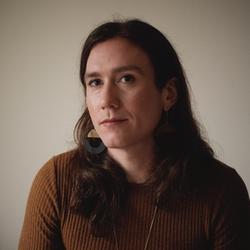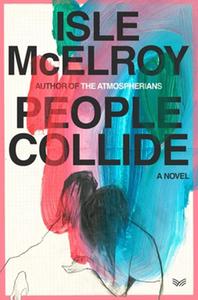
|
|
| photo: Jih-E Peng | |
Isle McElroy is a nonbinary writer living in Brooklyn, N.Y., whose debut novel, The Atmospherians, was named a New York Times Editors' Choice. Their writing has appeared in the New York Times, the New York Times Magazine, the Guardian, the Cut, Vulture, GQ, Vogue, the Atlantic, and Tin House. McElroy's second novel, People Collide (HarperVia, September 26), explores gender through the story of a husband and wife who switch bodies.
Handsell readers your book in 25 words or less:
People Collide is a continent-spanning magical realist novel about a husband and wife who trade bodies. It's funny. It's sexy. It's smart.
On your nightstand now:
I just finished--and thus removed from my nightstand--Catherine Lacey's first novel, Nobody Is Ever Missing. I've been a fan of Lacey's work for some time but had never read this novel. It's incredible, and it's been shocking to see how deeply the novel resonates with my own. Both are about a marriage coming undone, and the assumptions that partners make for each other. I love the spry curiosity and intelligence of Lacey's prose. I'll read anything she writes.
Favorite book when you were a child:
Confession: I didn't read that much when I was a kid. But when I did, I was obsessed with the Goosebumps franchise. At this point, I remember the titles more than I remember the plots of the books. But I have strong memories of green goo overtaking towns, and cameras that kill whoever poses for photos. Both of my novels have slight horror undertones, and I can't help but see these books as influences on my style as a writer.
Your top five authors:
Donald Barthelme, Deborah Eisenberg, Renee Gladman, Katie Kitamura, Robert Walser.
Book you've faked reading:
I don't know if this counts, but I've been halfway through The Magic Mountain for nearly a decade. I have told people that I've read it. And technically, I have read some of it, so that counts for something. But if anyone asks what happens after page 270, I won't be able to answer. I have, however, truly loved those first 270 pages every time I've given them a go--and, yes, it has been multiple times.
Book you're an evangelist for:
Helen DeWitt's The Last Samurai. I'm far from the only one who evangelizes this novel, but I really cannot get enough of it. It's so rare to write with such passion and intelligence--while also creating a gripping plot. I'm especially drawn to stories where characters are searching for someone important to them, and The Last Samurai, at its core, is a story of a boy looking for his father. The novel, however, is so far from sentimental. I can't recommend it enough.
 Book you've bought for the cover:
Book you've bought for the cover:
Lote by Shola von Reinhold. There is something very dignified about the cover, and the peacock at the center adds an air of mystery that made me extra curious about the book.
Book you hid from your parents:
This might not be the intention of the question, but I spent a few months hiding my first chapbook, Daddy Issues, from my father. I don't think I ever told him outright--he learned about the book because his partner saw something I posted online. There was nothing scandalous in the book, but I wasn't prepared to have a conversation with him about why I named a book Daddy Issues. Of course, he wanted to read it, and I was pleased to learn he didn't find it controversial at all. His takeaway: "This isn't about your daddy issues; it's about issues that dads have." We never spoke of the book again.
Book that changed your life:
It was probably Ernest Hemingway's The Sun Also Rises. I remember both loving the book and loving how I was taught to read it. I read it for the first time in a literary modernism class taught by a pretty old-school professor. But his love for the novel made it impossible to not love the novel. Hearing him talk about Hemingway's prose and vision--the passion and admiration in his voice--made me want to read the way that he read. That was a turning point for me as a writer and reader.
Favorite line from a book:
"One learns very little here, there is a shortage of teachers, and none of us boys of the Benjamenta Institute will come to anything, that is to say, we shall all be something very small and subordinate later in life."
This is the opening sentence of Robert Walser's Jakob von Gunten. It's about a boy who attends a butler academy where he is taught to be nothing. The novel was first published in 1909, but in its humor and tone, it feels very contemporary to me. It's one of my favorite books to reread. And the narrator's lighthearted self-doubt definitely helped shaped Eli's voice in People Collide.
Five books you'll never part with:
Sorry to Disrupt the Peace by Patrick Cottrell. Cigarettes by Harry Mathews. Dictee by Theresa Hak Kyung Cha. The Collected Stories of Deborah Eisenberg. Calamities by Renee Gladman.
Book you most want to read again for the first time:
Proxies by Brian Blanchfield. I read this book when it first came out and was completely blown away. I've been scared to reread it for that reason. Proxies is a collection of essays where Blanchfield relies entirely on memory, even when it means getting things wrong. There is an appendix noting his errors, but the pleasure of the book comes from the essays that precede the appendix, existing in that space where everything he says may or may not be true.
Your five favorite new(ish) books:
Wolfish by Erica Berry; Nevada by Imogen Binnie; I Do Everything I'm Told by Megan Fernandes; Pricks in the Tapestry by Jameson Fitzpatrick; Mother in the Dark by Kayla Maiuri.

